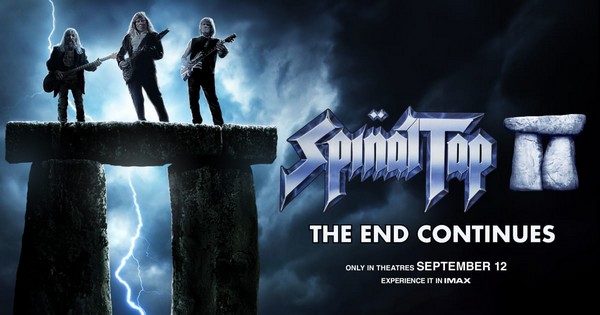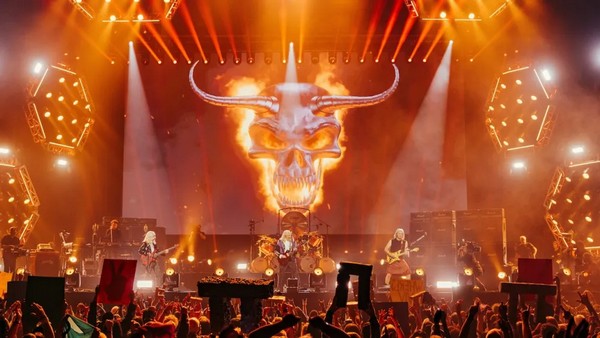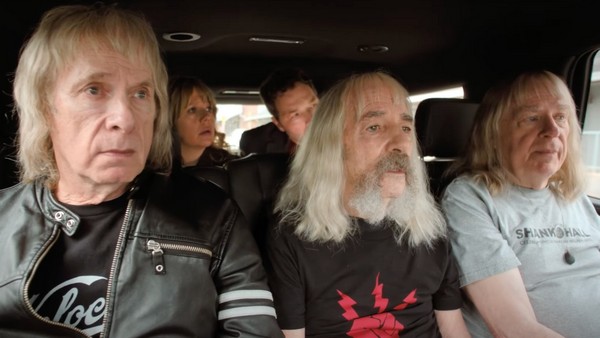 Legendary heavy metal band Spinal Tap reunites, once again followed by a documentary crew in the funny but less successful sequel Spinal Tap II: The End Continues, directed by Rob Reiner.
Legendary heavy metal band Spinal Tap reunites, once again followed by a documentary crew in the funny but less successful sequel Spinal Tap II: The End Continues, directed by Rob Reiner.
It’s hard to make a comedy sequel. Laughs, memorable ones, are so dependent on timing, the specifics of the scene, and set-ups. How can one recreate the laughs without repeating the jokes that made it work the first time around? It’s about recapturing the spirit through the characters, continuing what makes it work without treading the same ground (looking at you, Hangover II). So many amazing comedies have lesser sequels. Airplane, Supertroopers, Wayne’s World. Yes, even Ghostbusters II- and I say that as a superfan of the franchise and the first sequel as my personal favorite. Comedies are often lightning in a bottle, coming together out of sheer determination. The pressure of hitting the same high marks is a lot. Maybe too much. This Is Spinal Tap is a high-water mark in comedy. How does it fare in its own sequel, 41 years later? Spinal Tap II: The End Continues, written/improvised and directed by the same team, is a weaker film by a long way, but still solidly entertaining; a cozy nostalgia ride of a mockumentary.
This Is Spinal Tap, the 1984 mockumentary directed by Rob Reiner, followed the catastrophe-laden “final” tour of a fictional rock band Spinal Tap. The band, David St. Hubbins, Nigel Tufnel, and Derek Smalls, portrayed, respectively, by Michael McKean, Christopher Guest, and Harry Shearer, is filmed by Marti DiBergi (Reiner himself). The culmination of the 5 years of appearances across TV specials, SNL, and others, and written/improved by the quartet, is hilarious from start to finish. This is Spinal Tap is an eminently quotable parody of the rock star lifestyle, puerile heavy metal songs, egos, and life on the road. It was a perfect melding of character, humor, and anything-goes humor. While not an instant hit, it has been a staple of pop culture in the 40 years since; several albums, entry into the Criterion collection (the commentary is in character and one of my favorites), a few more tours, and my entry to the band, an appearance on The Simpsons (where Shearer is one of the man voices). In the time since, Guest himself has helmed a series of fanatic improvised mockumentaries, including Waiting for Guffman and A Mighty Wind (which featured the trio as “The Folksman,” who would open Spinal Tap concerts to boos by “fans” who don’t recognize them). With Reiner directing again, his first narrative in nearly a decade, does Spinal Tap still rock?
 They do, but it’s soft rock. Spinal Tap II comes nowhere close to reaching the comedic heights of the 1984 film. But it’s still very funny. It’s not a bad movie, not a pushed-through “hey look at this thing you remember!” But lesser and smaller. The plot of Spinal Tap II follows DeBergi and the band reuniting (thus, fun gags in what each member is up to now) to prepare for a final concert, a one-off in New Orleans. There they have the ups and downs of their histories, conflicts, and memories as they learn to work together again and bring back he magic of decades of friendship. They bicker, they reminisce, they deal with cutthroat jerk promoter Simon, too sweet manager Hope (daughter of cricket bat-wielding Ian Faith of the first film), and look for their 13th drummer. After a series of cameos of famous percussionists trying to avoid the curse of Spinal Tap drummers, ending up on Didi, played by Valerie Franco, with charismatic anarchy. She livens the film every time she’s around (though vanishes for long stretches).
They do, but it’s soft rock. Spinal Tap II comes nowhere close to reaching the comedic heights of the 1984 film. But it’s still very funny. It’s not a bad movie, not a pushed-through “hey look at this thing you remember!” But lesser and smaller. The plot of Spinal Tap II follows DeBergi and the band reuniting (thus, fun gags in what each member is up to now) to prepare for a final concert, a one-off in New Orleans. There they have the ups and downs of their histories, conflicts, and memories as they learn to work together again and bring back he magic of decades of friendship. They bicker, they reminisce, they deal with cutthroat jerk promoter Simon, too sweet manager Hope (daughter of cricket bat-wielding Ian Faith of the first film), and look for their 13th drummer. After a series of cameos of famous percussionists trying to avoid the curse of Spinal Tap drummers, ending up on Didi, played by Valerie Franco, with charismatic anarchy. She livens the film every time she’s around (though vanishes for long stretches).
The group of performers still can work through a scene and concept with ease; none of the jokes feel forced for a laugh, and they have a keen sense of their characters (one would hope after 46 years). While it rides an easy nostalgia wave, often referencing or returning to old jokes like the drummer curse or Stonehenge issues, there’s a natural cadence. But while not forced, it’s not trying too hard. Outside of the finale, there aren’t really too many sequences that require more than the trio and others hanging in a room, riffing and bickering. There’s a hangout atmosphere, like catching up with old friends. You talk about past events, reminisce about friends long gone, play some remembered songs (it is nice to hear Spinal Tap hits again; I couldn’t help but mouth along to Big Bottom, Tonight I’m Gonna Rock You Tonight, and other songs that perfectly parodied the immature but thought they were deep teenage bravado and ego rock). Some new songs work in, too. You create new memories, talk about the time we’ve missed, work out new issues, but ultimately, it’s all based on what you’ve shared before.
 Thus, it’s all a little slight. At 82 minutes, it clocks in at the same length as the previous film. But that film shoved so much in the short length, it feels longer (in a good way). The End Continues hums along, but feels incomplete. Many jokes or sequences feel like there was more that was cut, especially when the scene changes before done (a return of Fran Dresher’s Bobbi Flekman particularly feels truncated), but others trudge on far past their point, such as an argument about a key change. That scene has one of the rock god cameos; otherwise, it should have hit the cutting room floor. Keeping the action centered around rehearsals does keep the film from repeating the road issues, but also makes so much of the focus on half-assed personal clashes. Some set-ups aren’t paid off, or we’re waiting for the last push of a continued joke.
Thus, it’s all a little slight. At 82 minutes, it clocks in at the same length as the previous film. But that film shoved so much in the short length, it feels longer (in a good way). The End Continues hums along, but feels incomplete. Many jokes or sequences feel like there was more that was cut, especially when the scene changes before done (a return of Fran Dresher’s Bobbi Flekman particularly feels truncated), but others trudge on far past their point, such as an argument about a key change. That scene has one of the rock god cameos; otherwise, it should have hit the cutting room floor. Keeping the action centered around rehearsals does keep the film from repeating the road issues, but also makes so much of the focus on half-assed personal clashes. Some set-ups aren’t paid off, or we’re waiting for the last push of a continued joke.
There are many laughs to be found, mind you. I did laugh often, and occasionally very hard. There is some absolute gold. The guys play off one very well, and they are quick with wit, as seen in the live Q&A after my showing. If the goal is getting laughs and having a good time, it succeeds. Spinal Tap II: The End Continues is a funny, but lesser visit with old friends (and new with Franco; she rocks!). Spinal Tap II doesn’t quite turn it up to 11, but it did find its way to the stage.
